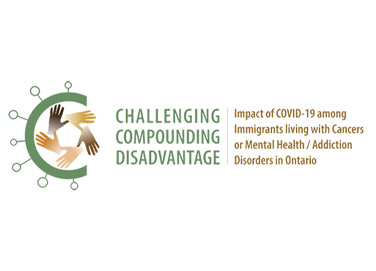Project Title
Challenging Compounding Disadvantage: Impact of COVID-19 among Immigrants living with cancer or mental health/addiction disorders in Ontario
( ccdproject.ca )

Project Leads
Objectives
The key objectives of the Challenging Compounding Disadvantage study are: (1) to explore the impact of COVID-19 on immigrants and racialized populations who also live with cancer or mental health & addiction conditions; (2) to engage stakeholders (people living with cancer or mental health & addiction conditions, service provider and policy/decision makers) in knowledge translation and exchange to plan effective and inclusive responses that reduce health disparities and promote equitable access to cancer and mental health and addictions services during pandemics or future crises.
Research questions
What is the impact of COVID-19 impact on immigrants and refugees living with cancer or mental health & addition (MH&A) compared to immigrants and refugees without cancer or MH&A, non-immigrants living with cancer or MH&A and non-immigrants without cancer or MH&A?
Background
While the COVID-19 pandemic affected all communities across Canada and the globe, its negative impacts have not been experienced equally. People living with cancer and/or mental health and addiction (MH&A) disorders experienced greater risk of COVID-19 infection and worse COVID-19 outcomes. Similarly, although immigrants and refugees make up one-quarter of Ontario’s population they make up nearly half of Ontario’s COVID-19 cases. There is a paucity of information on the impact of COVID-19 on people who are at the intersection of MH&A and socioeconomic deprivation.
Methods
In Phase One, use existing linked provincial-level administrative data to compare COVID-19 vaccination, diagnoses, hospitalizations, ICU admissions and mortality among immigrants with active cancers, and/or mental health and addictions, versus immigrants without these conditions and non-immigrants with and without these conditions; in Phase Two we will hold online think tank sessions to engage affected communities, service providers, and policy/decision-makers in knowledge translation and exchange to strategize effective and inclusive responses that reduce health disparities and promote equitable access to cancer and mental health and addictions services during pandemics or future crises.
Current Status
Phase One is completed and Phase Two is underway.
Expected completion
June 2024
Co-researchers & Partners
Jennifer Rayner (Alliance for Healthier Communities); Cynthia Damba (Ontario Health Toronto); Kenneth Fung (Toronto Western Hospital); Roula Kteily-Hawa (Brescia University College); Miya Narushima (York University); Wangari Tharao (Women’s Health in Women’s Hands). Collaborators: Cedar Sinai; Access Alliance Multicultural Community; Walnut Foundation; Flemingdon Health Centre; Woodgreen Community Services; Canadian Institute of Health Research, Ontario Health
Funding
Canadian Institute of Health Research (CIHR)
Key words
COVID-19; health inequities; immigrants and refugees; cancer; mental health / addiction disorders; population-based analysis